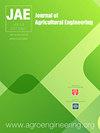Effect of Irrigation Level and Sowing Date on Yield of Field Bean in Saline Soils of Konkan Region of Maharashtra
IF 2.4
4区 农林科学
Q2 AGRICULTURAL ENGINEERING
引用次数: 0
Abstract
A field experiment was conducted during consecutive Rabi seasons of 2019-2020 and 2020-2021 in coastal saline soils at Khar Land Research Station, Panvel, Maharashtra, India to study the effect of different sowing dates and irrigation levels on the production potential of field bean. The experiment was laid out in factorial randomized block design (FRBD) with four replications, comprising three dates of sowing viz., immediately after harvest of paddy (D1 ), 10 days after harvest of paddy (D2 ), and 20 days after harvest of paddy (D3 ); and three irrigation levels viz., no irrigation (I0 ), one irrigation at flowering (I1 ), and one irrigation each at flowering and at pod formation (I2 ). The results showed that the treatment D1 recorded significantly higher seed yield of field bean (915 kg.ha-1) over D2 (713 kg.ha-1) and D3 (605 kg.ha-1). Among the irrigation levels, treatment I1 resulted in significantly higher seed yield of field bean (856 kg.ha-1) over I2 (726 kg.ha-1) and I0 (650 kg.ha-1). The treatment combination I1 D1 produced significantly higher seed yield of field bean (1065 kg.ha-1) with higher net realization (1,06,500 ₹.ha-1), net income (55,222 ₹.ha-1) and benefit cost ratio (2.08). Both sowing date and irrigation level played important role in management of root zone soil moisture and soil salinity which influenced the seed yield. Sowing of field bean immediately after the harvest of paddy and providing one irrigation at the time of flowering is recommended to obtain better yield and returns from the field beans cultivated in Konkan region of Maharashtra.灌溉水平和播期对马哈拉施特拉邦康坎盐碱地菜豆产量的影响
在印度马哈拉施特拉邦Panvel的Khar土地研究站,于2019-2020年和2020-2021年连续拉比季在沿海盐渍土上进行了田间试验,研究了不同播期和灌溉水平对大田大豆生产潜力的影响。试验采用因子随机区组设计(FRBD),设4个重复,3个播期分别为收获后即刻(D1)、收获后10 d (D2)和收获后20 d (D3);三个灌溉水平,即不灌溉(I0)、开花期灌溉一次(I1)、开花期和结荚期各灌溉一次(I2)。结果表明,D1处理的豆粒产量(915 kg.ha-1)显著高于D2处理(713 kg.ha-1)和D3处理(605 kg.ha-1)。在不同灌溉水平下,处理I1的豆粒产量(856 kg.ha-1)显著高于处理I2 (726 kg.ha-1)和处理I0 (650 kg.ha-1)。处理组合i1d1显著提高了大田大豆种子产量(1065 kg.ha-1),净变现(1.065万卢比.ha-1)、净收入(55222卢比.ha-1)和效益成本比(2.08)。播期和灌溉水平对根区土壤水分和土壤盐分的管理有重要影响,影响种子产量。在马哈拉施特拉邦的康坎地区,为了获得更好的产量和回报,建议在水稻收获后立即播种田豆,并在开花时进行一次灌溉。
本文章由计算机程序翻译,如有差异,请以英文原文为准。
求助全文
约1分钟内获得全文
求助全文
来源期刊

Journal of Agricultural Engineering
AGRICULTURAL ENGINEERING-
CiteScore
2.30
自引率
5.60%
发文量
40
审稿时长
10 weeks
期刊介绍:
The Journal of Agricultural Engineering (JAE) is the official journal of the Italian Society of Agricultural Engineering supported by University of Bologna, Italy. The subject matter covers a complete and interdisciplinary range of research in engineering for agriculture and biosystems.
 求助内容:
求助内容: 应助结果提醒方式:
应助结果提醒方式:


